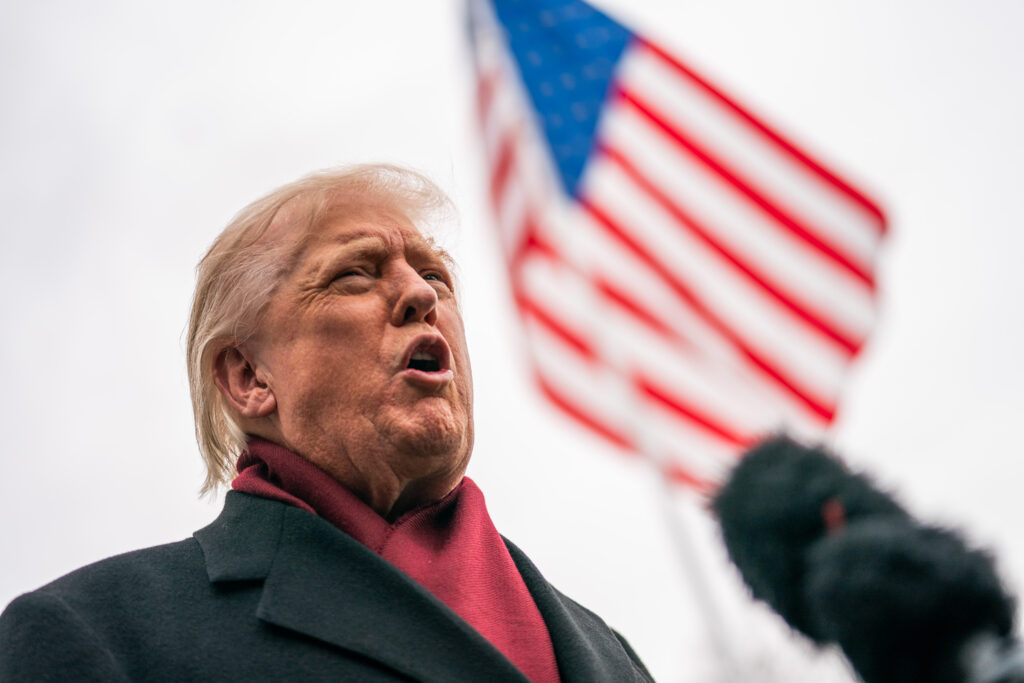New York Correspondences / Political and Geostrategic Observatory of the United States
24 November 2025
Trump, the Epstein files, and the Persistent Fantasy of His Downfall

Since 2015, predicting the “imminent downfall” of Donald Trump has become a national sport in certain French intellectual circles. A prophetic exercise as predictable as it is invariably wrong. Those who today confidently assure you that the Republican Party is irreversibly fracturing and that the Epstein files could bring Trump down are the same people who, in 2016, swore he would never be elected, and who in 2021, after 6 January, insisted he would be in prison within six months and had no chance of returning to power.
Let us pause for a moment on the facts. Donald Trump has never been so powerful. With rare exceptions, the Republican Party now follows him with near-military discipline. The Epstein files, despite the media noise, are merely a bump in the road. Unless truly devastating revelations emerge — Trump with an underage prostitute, for example — that might trigger impeachment proceedings, it is highly likely that it will slide off him like so many other scandals before it. As for Marjorie Taylor Greene, her brief rebellion is little more than political folklore: every authoritarian leader experiences such episodes. Those who still believe they see in her the beginnings of a meaningful internal revolt within the Republican Party would do well to change their glasses — or buy some.
Trump’s mistake was promising during his campaign to release all the Epstein files, and then refusing to do so once in office. This U-turn naturally fuelled every suspicion. But the bipartisan vote in Congress — 427 representatives in the House and unanimity in the Senate — does not reflect Republican rejection of Trump. It rather reveals their desire to keep a campaign promise in the face of voters who, since last spring, had begun to turn away from the president precisely because he had not kept that promise. Let us not forget that many of these elected officials are standing in the midterms: they did not want this issue to backfire on them.
Donald Trump eventually flipped on the matter; he had little choice. The question now is whether everything will truly be revealed. It is highly likely that certain documents he would have preferred remain hidden will indeed come to light. But, according to most well-informed American observers, nothing should genuinely endanger him — embarrassing material, certainly, but probably less serious than what awaits certain Democratic figures. Trump will likely emerge strengthened from this episode, and the few internal tensions within the Republican Party will fade quickly.
Let us stop fixating on the moment. Let us look at the big picture.
I will not return here to the successes achieved by the 47th President of the United States — at least in the eyes of his supporters — on both domestic and foreign fronts; I have written enough about this already. Of course, in the medium term, his policies will drive America into a wall and cost it a significant part of its international influence. But for now, the authoritarian regime that he and J. D. Vance are putting in place, with the help of people such as Susie Wiles, the White House Chief of Staff, is well on its way to becoming entrenched.
Two recent developments attest to this, emblematic of the New York billionaire’s strategic grip on the political and media landscape. First, the shutdown showdown: the Democrats yielded without the slightest concession — it is within the party of the donkey, rather, that one might speak of genuine fractures. Then, this communication masterstroke: warmly receiving Zohran Mamdani, the newly elected mayor of New York, who remained standing there like a little boy, frozen, smiling, almost complicit, while the master of the house announced not a peace plan but a capitulation plan for Ukraine.
It is highly likely that Zelensky will have no choice but to more or less approve this plan. And if Trump secures a ceasefire — or something that can be presented as such — before Christmas, as I have been “predicting” for months, he will triumph not only on the American domestic stage but also internationally in the eyes of many actors.
So let us stop interpreting every turbulence within the Republican Party or every unfavourable poll as a sign of Trump’s imminent end. This regime is here to stay. And the most dangerous, the most worrying aspect, is everything it is prepared to undertake in order to retain power. European observers who continue to forecast his collapse would do better to analyse how to resist his growing influence over Western right-wing movements and the normalisation of a political model that disregards democratic safeguards. For this is the real issue: not the fantasised fall of Trump, but the consolidation of a power transforming American institutions in depth.
Romuald Sciora heads the Political and Geostrategic Observatory of the United States at IRIS, where he is an Associate Research Fellow. A Franco-American essayist and political scientist, he is the author of numerous books, articles and documentaries and is a regular commentator on international news in global media. He lives in New York.

